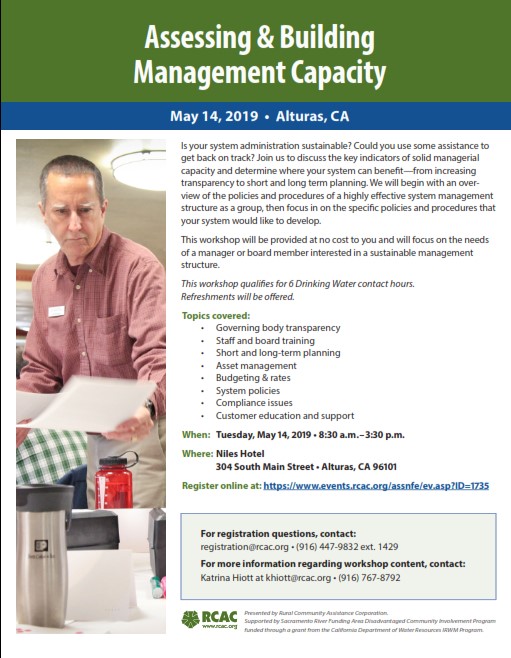
Assessing & Building Management Capacity – May 14, 2019



The California Department of Fish and Wildlife’s Wetlands Restoration for Greenhouse Gas Reduction Program is planning its grant cycle for 2019. Project areas include coastal tidal wetlands, Delta wetlands, inland wetlands, and mountain meadows. Grant details and timelines are available on the individual fact sheets.
Main Program Webpage: https://wildlife.ca.gov/Conservation/Watersheds/Greenhouse-Gas-Reduction
The Department of Water Resources has released the Final Proposition 1 Integrated Regional Water Management (IRWM) Grant Program documents, including:
These newly released documents, as well as other information about the Proposition 1 IRWM Grant Program can be found at: https://water.ca.gov/Work-With-Us/Grants-And-Loans/IRWM-Grant-Programs/Proposition-1/Implementation-Grants
This week’s California Water Plan eNews includes:
The Department of Conservation is hosting three workshops to present the on the Proposition 68 Working Lands and Riparian Corridors Program Guidelines and Solicitation Notices for Land Trust Capacity and Project Development Grants and Local and Regional Planning Projects Grants and to solicit input from the public. Please join us for one of the following workshops:
May 9
11:00 A.M. until 2:00 P.M.
(first presentation at 11:00 A.M., Second Presentation at 1 P.M.)
Madera County Government Center
Classroom 2005 – second floor
200 W 4th St, Suite 4200, Madera, 93637
May 15
San Diego
Date, Time, and Location TBD
May 16
10:00 AM until 12:00 PM
Department of Conservation, Division of Land Resource Protection
Walnut Room
801 K Street, Sacramento CA 95816
Webcast will be available for the May 16 workshop. Please RSVP as space is limited by calling 916-324-0850 or email.
More information about the draft Guidelines and solicitations can be found at the Department of Conservations program website. Public comment will be accepted until May 20, 2019 and may be submitted via email.
Funding Research Memos for fuel reduction, parks and trails, habitat preservation, environmental education, and other program areas are available on the SNC funding opportunities webpage. This is a great way to find funding opportunities for your projects!
Upcoming Grants that Might be of Interest:
Your SNC Area Representative can help you set up an individual consultation with the SNC Funding Team to get advice about specific funding opportunities or general fund development strategies. To take advantage of this resource, contact your Area Representative.
Grant Writing Workshops are available to help build the capacity of organizations that serve the Sierra Nevada Region. If you are interested in organizing or attending a workshop, contact your Area Representative. Upcoming workshops are scheduled in Shasta and Amador counties, and additional workshops can be scheduled upon request.
This week’s California Water Plan eNews includes:
The California Natural Resources Agency has just published draft Guidelines for a new Proposition 68 Green Infrastructure grant. This program has $18.5 million dollars to invest in projects which accomplish at least one of the following:
Projects must be located in or benefit disadvantaged or severely disadvantaged communities.
The examples provided in the Guidelines include:
The draft deadline for applications is June 28. The Resources Agency will be holding three public hearings on the Guidelines in early March. See the website for details.
This week’s California Water Plan eNews includes:
This week’s California Water Plan eNews includes: